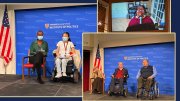During a panel discussion Wednesday evening at the Harvard Kennedy School (HKS), politicians and educators came together to discuss why disabilities remain relatively ignored in classrooms and unnoticed in public policy. Throughout the evening, the panelists returned to the question of “value.” To what lengths must we go to show that people with disabilities provide great contributions to the world? How can we demonstrate that creating a more accessible world for people with disabilities benefits people of all ability levels? And must we prove the societal value of people with disabilities in order for them to gain respect?
The event—co-sponsored by the Institute of Politics; HKS Office of Diversity, Inclusion, and Belonging; and HKS Alumni Board—featured four disability-rights activists with ties to the school. U.S. Rep. James “Jim” Langevin, M.P.A. ’94, spent two decades representing Rhode Island and was the first quadriplegic to serve in Congress. Sara Minkara, M.P.P. ’14, who is blind, works as the State Department’s Special Advisor on International Disability Rights. Brooke Ellison ’00, M.P.P. ’04, was the first quadriplegic to graduate from Harvard and now teaches medical ethics at Stony Brook University. The moderator, visiting professor of law Michael Ashley Stein, J.D. ’88, co-founded the Harvard Law School Project on Disability and teaches the only HKS class about disabilities.
Stein dedicated the conversation to the memory of the recently deceased Judy Heumann, whom he called “the most iconic…domestic and international disability rights advocate.” Seeking to honor her legacy, the panelists agreed that much more work is necessary to ensure that people with disabilities can lead full, active lives in the United States.
The speakers acknowledged the country’s tremendous progress in disability rights during the last three decades. Langevin became paralyzed in 1980, 10 years before the Americans with Disabilities Act (ADA) became law. “I remember before ADA, if something was accessible…it was luck, or it was a courtesy that was extended. And then after we passed ADA, that paradigm shift showed that accessibility has to be a civil right, that people with disabilities have a right to live active and independent lives.”
To emphasize the importance of disability rights legislation, presenters encouraged people to consider how fragile health is. “Disability is the great connector,” said introductory speaker Priscilla Mensah, M.P.P. ’23, who chairs the school’s Disability Justice Caucus. “It’s the protected characteristic we may all one day possess. And for that reason, making policy for us makes policy for everyone.”
The panelists said that too often, prevailing narratives frame people with disabilities as undesirable, unproductive members of society. Brooke Ellison reviewed several popular frames for understanding disability. In the moral model, people ask what went wrong that caused a person to have a disability. In the medical model, disabilities are viewed as physical failures. In the economic model, people with disabilities are viewed as drains on society. These mainstream ways of understanding disabilities, she said, all dehumanize the people who have them.
Sara Minkara advocates for upending the existing economic model. When speaking with other government officials and diplomats, she stresses how people with disabilities contribute to the global community. Modern disability activism, especially in the United Nations, focuses on disabled rights as human rights. But Minkara wants to highlight the financial and social contributions of people with disabilities. “When we don’t integrate disability into our economy,” she said, “it impacts our GDP. When we don’t integrate disability into the climate action agenda, we’re not attaining fully inclusive, sustainable solutions…We’re not including the innovation that we can bring to the table.”
To demonstrate how accessibility for people with disabilities helps everyone, Minkara shared a story from her undergraduate studies at Wellesley College. Her peers in the math department would ask her what classes she was taking the next semester, telling her that “whenever you’re in the classroom, the professor becomes a better teacher.” Minkara said that due to her blindness, her professors “had to explain what was on the board in a more typical way,” and everyone benefited from it.
The panelists did not restrict their discussion to abstraction; they suggested concrete policy changes at the national and university levels. Langevin talked about the importance of eliminating income caps on disability benefits. In most states, people with incomes over a certain level become ineligible for government disability support. This limits their earning potential: Langevin said he knows people who have turned down promotions because the accompanying pay raise would cause them to forfeit their much-needed aid for expensive medical care.
At Harvard, most of the suggested changes involved the Medical School. Responding to a question from bioethics master’s student Constantine Psimopoulos, Ellison suggested enhancing the curriculum in medical ethics and medical philosophy. She hopes that when physicians learn about ethics and philosophy (alongside a more substantial knowledge of disabilities), they will be better equipped to handle conversations about very challenging issues concerning quality of life and physician-assisted suicide. If doctors do not have a robust education about disabilities, Ellison fears they will encourage people “to end their lives…if they incur some kind of disability like my own—unless that conversation is shifted to the possibilities of life, and the opportunities to live really rewarding and fulfilling lives.”
Even if conversations about disability can be difficult to navigate, they are necessary in order to improve the lives of people with disabilities and, by extension, all people. “If we’re silent, the issue goes away,” said Langevin. “And the fact that we’re talking about this, and we keep the issue of disability front of mind, then hopefully, we see action, we see change.”









